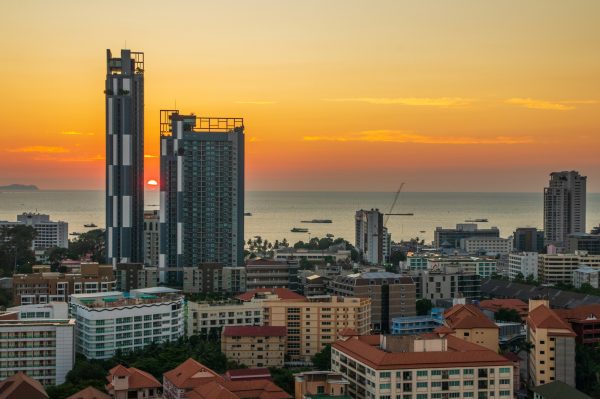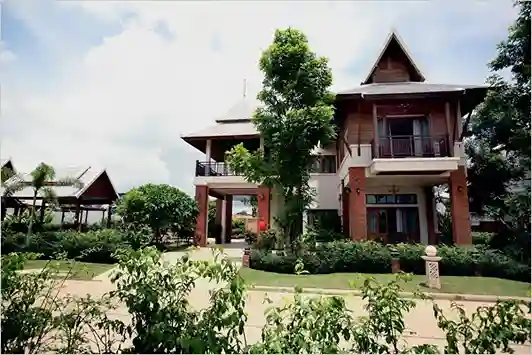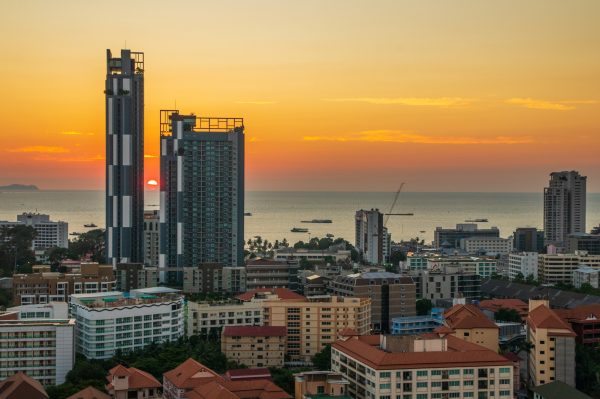
admin
2 years ago

Thailand's luxury real estate market is poised for a strong year in 2024, driven by a confluence of factors including a recovering global economy, a surge in remote work, and Thailand's long-standing appeal as a tourist destination.
The country's luxury real estate market has already seen signs of recovery in 2023, with an increase in sales and prices in key markets such as Bangkok, Phuket, and Chiang Mai. This trend is expected to continue in 2024, as more wealthy buyers from around the world look to Thailand for their second homes or investment properties.
The luxury real estate market in Thailand is still relatively small compared to other countries in the region, but it is growing rapidly. In 2023, the market was valued at around $5 billion, and it is expected to grow to $7 billion by 2024. This growth is being driven by a number of factors, including the increasing demand for luxury properties from wealthy buyers, the government's efforts to promote tourism, and the development of new luxury projects.
The outlook for Thailand's luxury real estate market is positive, and the country is expected to see continued growth in 2024. This growth will be driven by a number of factors, including the recovering global economy, the rise of remote work, and Thailand's long-standing appeal as a tourist destination.
Beyond lifestyle allure, Thailand's luxury real estate market presents attractive investment opportunities. With a stable economy, a growing tourism sector, and a limited supply of prime properties, luxury real estate offers the potential for strong capital appreciation and rental yields.
Whether you seek a luxurious vacation home, a savvy investment, or a permanent escape to paradise, Thailand's luxury real estate market has something for everyone. With its diverse offerings, thriving economy, and unparalleled beauty, Thailand promises a lifestyle unlike any other.
First, let's talk tourism. It's bouncing back in a big way. Tourists bring smiles and dollars, and that's good news for condos and vacation homes, especially in hotspots like Phuket and Pattaya. Expect a bump in sales and rentals around popular beaches.
Next, there's the economy. It's chugging along steadily, projected to grow around 4.5% this year. This means more people have money to spend, potentially increasing demand for homes across the board.
But let's not forget inflation. It's creeping up, and that could make borrowing for a new home more expensive. This might cool down the hottest markets a bit, especially for luxury properties.
Speaking of money matters, the Thai government is raising interest rates. This could also slow down borrowing and dampen overall market enthusiasm.
Finally, keep an eye on the global picture. Economic uncertainties and potential recessions elsewhere could make investors cautious, impacting foreign investment in Thai real estate.
So, what does it all mean for the 2023 Thailand real estate market? Expect a slower but steadier growth compared to the recent boom. While some segments might cool down, overall, the market should remain healthy, especially in tourism-dependent areas and for affordable housing options.

Foreign buyers are back in a big way! China's reopening unleashed a wave of investment, with condo transfers by foreigners jumping a whopping 79% in the first quarter compared to 2022. This surge is primarily focused on tourist hotspots like Chonburi and Bangkok, boosting demand and potentially pushing prices upwards.
While foreigners are splashing around, domestic buyers face choppier waters. Inflation and rising interest rates are making mortgages tougher to swallow, dampening their buying power. This could create a two-tiered market, with foreign-driven growth in specific areas contrasting with slower domestic activity.
Ongoing infrastructure projects like high-speed rails and airport expansions are opening up new frontiers for developers. These areas might see a surge in residential and commercial properties, especially catering to logistics and tourism needs.
The Thai government is trying to stabilize the market with measures like easing foreign ownership regulations and promoting digital innovation. These initiatives could further attract foreign investment and boost overall market confidence.
When politics get messy, with protests, elections, or disagreements, it can feel like the ground under your feet is unsure. This lack of confidence makes people less likely to invest in big purchases like houses or condos. Developers also hesitate to launch new projects, worried about finding buyers in a shaky market.
The government's decisions can directly impact the real estate market. Think of it like levers pulling and pushing. Policies on taxes, infrastructure, tourism, and foreign investment can all influence demand, prices, and development. For example, a government that prioritizes affordable housing might offer subsidies or build more public housing, which could cool down the high-end market.

So, what's the outlook for Thailand's real estate market? It depends on the political rollercoaster's current course. If things settle down and the government implements policies that boost the economy and address housing needs, the market could see a bright future. But if the turbulence continues, it might be wise to buckle up and wait for a smoother ride before taking the plunge into property investment.
Here are some reasons why:
Thailand's luxury real estate market is gearing up for an exciting year in 2024, with trends shaping up across residential, commercial, and industrial segments. Let's dive into each area:
While Thailand's economy won't be breaking any speed records in 2024, things will still be moving along steadily. Expect growth of around 2.8-3.3%, driven by factors like a government-backed "digital wallet" scheme that could boost spending. Exports are also expected to pick up, growing by 2-3%, after a slow year in 2023.
But it's not all sunshine and rainbows. Inflation will likely hang around 1.7-2.2%, and household debt remains a concern. Rising interest rates could put a damper on borrowing and investment. So, while things won't be booming, they won't be crashing either. It's a year of cautious optimism.

There are a few factors that are contributing to the increase in interest rates in Thailand. One is the global rise in interest rates. As central banks around the world move to combat inflation, they're raising interest rates. This is making it more expensive for banks to borrow money, which they then pass on to borrowers in the form of higher interest rates.
Another factor is the specific situation in Thailand. The Thai economy is growing, but it's also facing some challenges, such as rising inflation and a weakening currency. In order to try to stabilize the economy, the Bank of Thailand has been raising interest rates.
However, it's important to remember that interest rates are cyclical. They go up and down over time. So, while the current interest rate hike may make it more challenging to buy a home in the short term, it's not necessarily a sign that you should give up on your dream of homeownership.
With the rising popularity of electric vehicles (EVs), it's only natural that the demand for charging infrastructure is also on the rise. In order to keep up with this demand, many experts believe that it's only a matter of time before EV chargers become a standard feature in every new construction project.
There are several reasons why this makes sense. First, it would help to make EVs more accessible to more people. If every new home, office, and apartment building came equipped with an EV charger, it would be much easier for people to make the switch to electric vehicles.
Second, it would help to reduce range anxiety, which is one of the biggest concerns that people have about EVs. Range anxiety is the fear of running out of battery power before you reach your destination. With more chargers available, EV drivers would have less to worry about.
Third, it would help to improve air quality. EVs produce zero emissions, so having more EVs on the road would help to reduce pollution levels.
In addition to these environmental benefits, there are also economic benefits to making EV chargers a standard feature in new construction projects. For example, it would create jobs in the EV charging industry. It would also make properties more attractive to buyers and renters, as people are increasingly looking for homes and businesses with EV charging facilities.
The future of Thailand's luxury real estate market in 2024 is sparkling with potential, but navigating it requires careful consideration for different players. Whether you're a buyer, seller, landlord, or tenant, here's a breakdown of the opportunities and considerations to help you make informed decisions:
Opportunities: Rising tourism and infrastructure upgrades are expected to fuel demand, potentially leading to price appreciation. Government incentives like tax breaks and visa programs could sweeten the deal. You might find attractive deals on existing properties due to market adjustments.
Considerations: Interest rates could rise, impacting affordability. The global economic climate could affect foreign investment. Be cautious of overly optimistic projections and conduct thorough due diligence before buying.
Opportunities: Increased demand could lead to quicker sales and potentially higher prices. The market might be receptive to unique or well-located luxury properties.
Considerations: Be prepared for negotiations, especially for high-end properties. The market might be competitive, requiring strategic pricing and marketing. Consider offering financing options to attract buyers.
Opportunities: Rising rental yields are expected, driven by increased tourism and demand for luxury living. Long-term leases with reliable tenants can offer stable income.
Considerations: Manage your property professionally to attract and retain high-paying tenants. Be prepared for potential fluctuations in rental income due to economic factors. Ensure your property meets legal and safety standards.

Opportunities: You might find more flexible lease terms and potentially lower rents due to market adjustments. Negotiate for longer leases to secure stable rental rates.
Considerations: Be prepared for potential rent increases as the market recovers. Thoroughly research the property and lease agreement before signing. Consider factors like location, amenities, and maintenance responsibilities.
Thailand's property market is a dynamic landscape teeming with potential, but like any investment, it comes with its fair share of hurdles. Let's delve into both sides of the coin for housing projects and the commercial property sector in this fascinating Southeast Asian nation.
The Thai government recognizes the importance of housing and offers various incentives for developers, including tax breaks and land subsidies. This can significantly reduce project costs and attract investors.
Thailand's middle class is expanding rapidly, leading to increased disposable income and a desire for better living standards. This opens doors for developers to cater to this segment with quality housing options.
Finding affordable land, especially in prime locations, can be a major obstacle for developers. Strict land ownership regulations and competition from other sectors further complicate matters.
Overburdened infrastructure in some areas can pose challenges for new housing projects. Developers need to carefully consider factors like water supply, sanitation, and transportation before breaking ground.
2024 promises to be a year of exciting new horizons for Thailand's luxury property market. Picture this: sleek, modern condominiums with infinity pools overlooking turquoise waters, nestled amidst lush islands or buzzing cityscapes. These aren't just daydreams; they're the reality coming to life in exciting new projects across the kingdom.
CBRE, a big name in real estate, recently put out a report on Thailand's market for 2023. Here's the gist of what they're saying, broken down into bite-sized chunks:
Thailand's luxury property market has long been a magnet for international investors, and for good reason. With its stunning beaches, vibrant culture, and world-class amenities, Thailand offers a unique and desirable lifestyle. But is 2024 the right time to invest in Thai luxury real estate?
Factors to Consider
Challenges to Consider
Overall, whether or not to invest in Thailand's luxury property market in 2024 is a decision that each individual investor must make based on their own risk tolerance and financial goals. However, the factors mentioned above should help you make an informed decision.
I hope this information is helpful. Please let me know if you have any other questions.
(Bangkok Real Estate Market)
(Thailand Investment Property)
(Second Home Investment)
(Koh Samui Real Estate)
(Best Beaches In Thailand)
Information and statistics for This Post Provided by Yoohoo Homes.